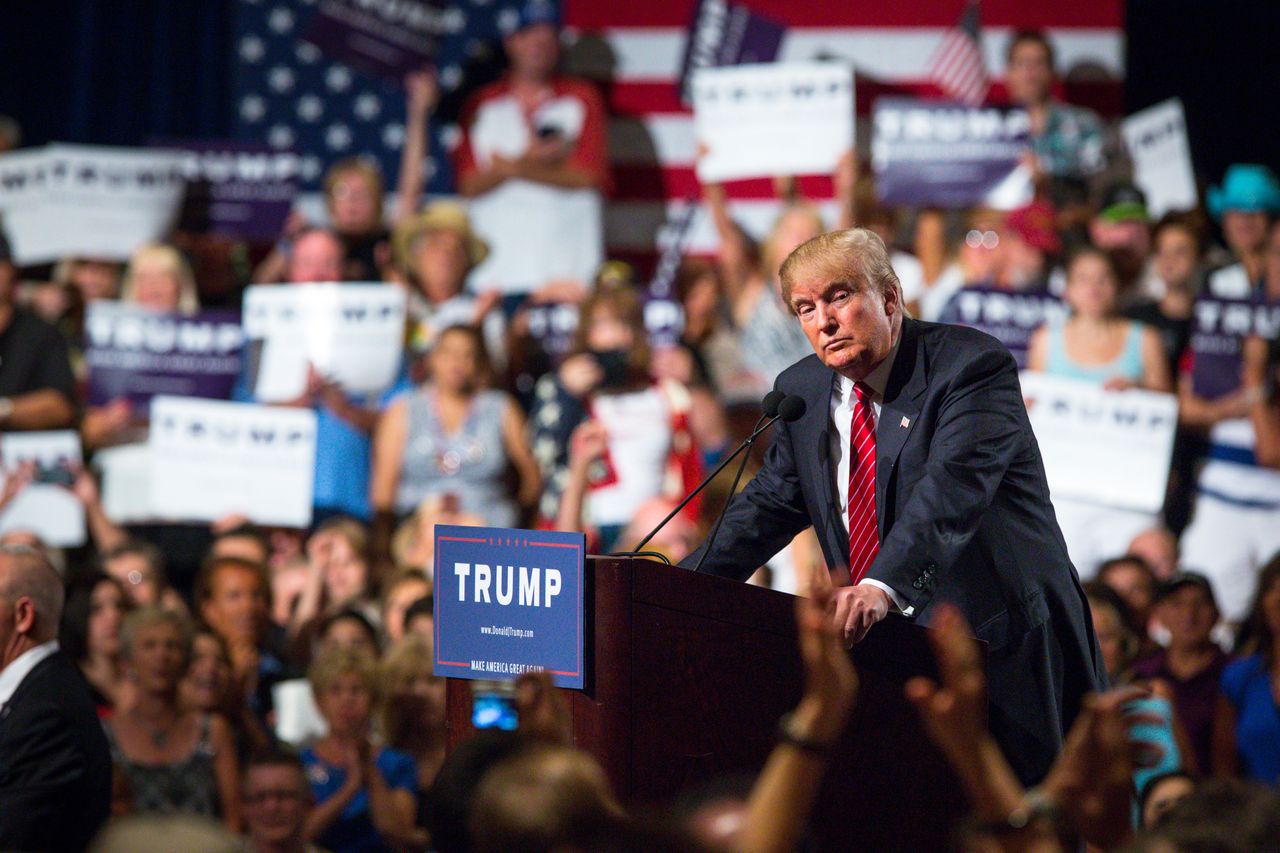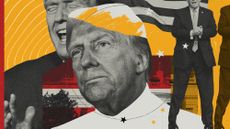Saving DACA can't save Trump
Trump's DACA deal can't rescue his enduringly awful legacy. Nothing can.


It's too late for President Trump.
Yes, it's still early in his presidency. Yes, it's welcome news that he appears to be nearing an agreement to keep young migrant "DREAMers" at home in the United States. And yes, it's fun to watch Trump's anti-immigrant base melt down over these developments.
But all the bipartisan deal-making in the world is still not enough to undo Trump's essential, ugly legacy: He unleashed overt racism as a newly resurgent force in American politics. And the country is much, much worse for it.
Subscribe to The Week
Escape your echo chamber. Get the facts behind the news, plus analysis from multiple perspectives.

Sign up for The Week's Free Newsletters
From our morning news briefing to a weekly Good News Newsletter, get the best of The Week delivered directly to your inbox.
From our morning news briefing to a weekly Good News Newsletter, get the best of The Week delivered directly to your inbox.
Birtherism. The Muslim ban. Charlottesville. Not since the days of George Wallace has American society seen a national political figure so routinely and overtly appeal to white racial sentiments. It's gotten so bad that Congress was forced to act this week, passing a bipartisan resolution condemning the "white nationalists, white supremacists, the Ku Klux Klan, neo-Nazis, and other hate groups" that Trump pointedly refused to condemn in the immediate aftermath of last month's racial violence.
In the wake of all that, Trump's decision to seek a deal that would legalize the status of young migrants brought here illegally as children seems a bit cynical. The president clearly needs a win — the passage of significant legislation, a little love from The New York Times — and he's willing to cross his supporters to get it.
This too, is reminiscent of George Wallace, who spent the last years of his career letting everybody know he'd renounced segregation — after the cause of segregation had been defeated. "I've learned what pain is and I'm sorry if I've caused anybody else pain," he said after surviving an assassination attempt in 1972.
That's not really what we remember about Wallace, is it? No, we remember that he stood in the schoolhouse doors, trying to keep black children from entering. And we remember his thundering declaration, "Segregation now, segregation tomorrow, segregation forever!"
Everything that came after was the postscript. The damage had already been done.
"I ain't even interested in what he's saying," Rufus Vanable, who marched on Selma, said during one of Wallace's apology tours. "If you lived through it, you wouldn't be either. If he thinks this will ease his mind in some way, let him do it. I'm not interested in looking at his face. It brings back too many memories."
The same will be true of Trump. If his actions allow young DREAMers to remain in the United States, that's fantastic. It nonetheless remains true that during his campaign, he found it difficult to rebuke David Duke, the notorious former Klansman who had announced his support for Trump. And it is also true that when racists marched in Charlottesville last month, they did so proclaiming Trump as their inspiration.
"We are going to fulfill the promises of Donald Trump," Duke said at that rally. "That's why we voted for Donald Trump, because he said he's going to take our country back and that's what we've got to do."
This is Trump's real legacy.
Of course, racial tension has always existed in American politics. That's not Trump's fault. The Republican Party spent two generations, from Richard Nixon onward, embracing a "Southern strategy" of appealing to whites alienated from the Democratic Party in the aftermath of 1960s civil rights legislation championed by President Lyndon Johnson. But during those years, even those politicians who preyed on racial resentments acknowledged that explicit racism itself was a losing proposition — they chose instead to cloak their appeals through "dog whistles" about crime and states' rights.
Believe it or not, this was a good thing: Hypocrisy, after all, is the tribute that virtue pays to vice. It's better for society when even racists have to pretend they believe racism is bad.
Trump ripped up that consensus for his own ends. Perhaps now, after months of falling poll numbers have left him so unpopular he can't even show his face at apolitical events like the Kennedy Center Honors, he has reconsidered.
Great. But also: Too late. The damage has been done. If he thinks this will ease his mind in some way, though, let him do it.
Sign up for Today's Best Articles in your inbox
A free daily email with the biggest news stories of the day – and the best features from TheWeek.com
Joel Mathis is a writer with 30 years of newspaper and online journalism experience. His work also regularly appears in National Geographic and The Kansas City Star. His awards include best online commentary at the Online News Association and (twice) at the City and Regional Magazine Association.
-
 Decrepit train stations across the US are being revitalized
Decrepit train stations across the US are being revitalizedUnder the Radar These buildings function as hotels, restaurants and even museums
By Justin Klawans, The Week US Published
-
 Crossword: January 30, 2025
Crossword: January 30, 2025The Week's daily crossword
By The Week Staff Published
-
 Sudoku medium: January 30, 2025
Sudoku medium: January 30, 2025The Week's daily medium sudoku puzzle
By The Week Staff Published
-
 Will Trump's 'madman' strategy pay off?
Will Trump's 'madman' strategy pay off?Today's Big Question Incoming US president likes to seem unpredictable but, this time round, world leaders could be wise to his playbook
By Sorcha Bradley, The Week UK Published
-
 US election: who the billionaires are backing
US election: who the billionaires are backingThe Explainer More have endorsed Kamala Harris than Donald Trump, but among the 'ultra-rich' the split is more even
By Harriet Marsden, The Week UK Published
-
 US election: where things stand with one week to go
US election: where things stand with one week to goThe Explainer Harris' lead in the polls has been narrowing in Trump's favour, but her campaign remains 'cautiously optimistic'
By Harriet Marsden, The Week UK Published
-
 Is Trump okay?
Is Trump okay?Today's Big Question Former president's mental fitness and alleged cognitive decline firmly back in the spotlight after 'bizarre' town hall event
By Harriet Marsden, The Week UK Published
-
 The life and times of Kamala Harris
The life and times of Kamala HarrisThe Explainer The vice-president is narrowly leading the race to become the next US president. How did she get to where she is now?
By The Week UK Published
-
 Will 'weirdly civil' VP debate move dial in US election?
Will 'weirdly civil' VP debate move dial in US election?Today's Big Question 'Diametrically opposed' candidates showed 'a lot of commonality' on some issues, but offered competing visions for America's future and democracy
By Harriet Marsden, The Week UK Published
-
 1 of 6 'Trump Train' drivers liable in Biden bus blockade
1 of 6 'Trump Train' drivers liable in Biden bus blockadeSpeed Read Only one of the accused was found liable in the case concerning the deliberate slowing of a 2020 Biden campaign bus
By Peter Weber, The Week US Published
-
 How could J.D. Vance impact the special relationship?
How could J.D. Vance impact the special relationship?Today's Big Question Trump's hawkish pick for VP said UK is the first 'truly Islamist country' with a nuclear weapon
By Harriet Marsden, The Week UK Published